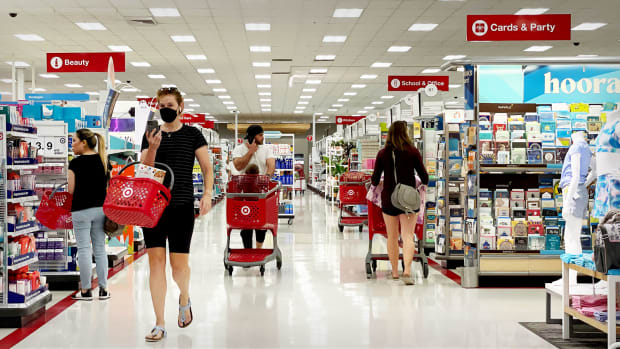
Retailers are under siege, at least that’s the narrative the industry has been pushing in recent months. Violent crime in the cities, increasingly brazen organized groups running sophisticated smash and grab operations in stores, and unruly consumers making off with electronics and other high priced goodies.
As a result, retailers are losing billions of dollars, forcing them to pass on costs to consumers and even close stores. Target (TGT) CEO Brian Cornell made retail theft a top topic in discussing first quarter earnings with analysts and the media. Conservatives touted Cornell’s remarks as proof that liberal mayors in cities are too soft on crime.
DON'T MISS: Target, Walmart and Best Buy Desperately Need Apple
But here’s what retailers and the broader industry are not really talking about: a lot of the theft comes from within. While outside groups and individuals are certainly culprits, employee dishonesty and misconduct has also been a growing problem since the pandemic.
According to a survey by the National Retail Federation (NRF) last year, nearly 57% of retailers identified “internal theft” as a growing risk over the past five years, with 20.7% of that group saying that the threat has become “much more” of a problem.
Inventory shrinkage a complex issue
Overall, the NRF estimates inventory losses in 2022 at $94.5 billion. How much of that comes from employee theft is not clear. But the NRF and major retailers have launched major campaigns to lobby officials and educate the public about the threat posed by organized retail crime (ORC) groups.

Image source: Justin Sullivan/Getty Images
The NRF recently commissioned a major report on the issue that concluded “ORC is a persistent and growing problem in the United States that available evidence suggests is growing in its scope and complexity.”
Cornell of Target has emerged as one of the most vocal retail CEOs on the issue.
“Theft and organized retail crime are increasingly urgent issues, impacting the team, and our guests and other retailers,” Cornell told analysts.
“The problem affects all of us, limiting product availability, creating a less convenient shopping experience, and putting our team and guests in harm's way,” he said. “And when products are stolen, simply put, they're no longer available for guests who depend on them. And left unchecked, theft, and organized retail crime to degrade the communities we call home.”
But the industry’s singular focus on outside factors masks the complexity — and vulnerability — of the supply chain that the public doesn’t normally see. Thieves, both employees and outsiders, steal lots of goods from manufacturers to the distribution centers and from distribution centers to the store. Again, how much such cargo thefts contribute to the $94.5 billion losses the NRF cites versus ORC is not known.
Dealing with employee thefts
For retailers, employee thefts is understandably a sensitive topic that they are not eager to publicly discuss. But you can find plenty of news stories about Target and Walmart employees stealing everything from cash to electronics.
“We don’t have anything else to add at this time,” a Target spokeswoman said.
Walmart Stores Inc. (WMT) did not respond to a request for comment.
In the past, critics have attacked Walmart and Target for paying low wages, a factor that might tempt employees to pocketing some merchandise here and there. After all, the same economic difficulties that push people to steal also apply to workers with ready access to merchandise in stores. And since retail work is hardly glamorous, retailers have consistently struggled to hire workers so they might not be particularly picky about who they hire.
The shortage of workers was especially acute during the pandemic. Since then, both Walmart and Target have made big efforts to recruit and retain workers with better wages and benefits and increased training.
Target has raised its wages to $15 to $24 an hour across the country, well above the federal minimum wage and that of many states. The retailer also talked up Dream to Be, which offers free tuition for workers to gain degrees at more than 40 schools, colleges and universities.
“We are focusing this year on training and development for our team with an emphasis firmly centered on retail fundamentals,” chief operating officer John Mulligan recently told analysts.
But the NRF survey suggests that many retailers have neglected the issue. For example, the survey found that 70.9% of retailers lacked a specific financial threshold (value of stolen merchandise) that would trigger them to prosecute employees who steal.
Organized theft and general street crime no doubt hurt retailers. But perhaps retailers should also look inward and figure out what they can better control to stem the losses from inventory shrinkage.







